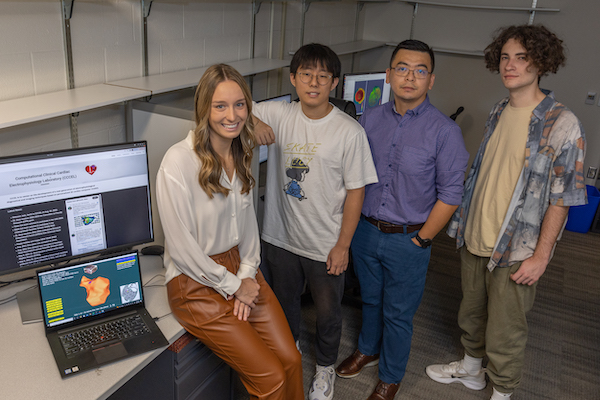Miami CEC Assistant Professor Shijie Zhou receives grant from the National Heart, Lung, and Blood Institute
This grant will provide resources, equipment, and support for a new clinical prospective study, as well as multiple new professional opportunities for Miami students.

Miami CEC Assistant Professor Shijie Zhou receives grant from the National Heart, Lung, and Blood Institute
Shijie Zhou, Ph.D., Assistant Professor of Miami CEC’s Chemical, Paper and Biomedical Engineering department, has received a grant from the National Heart, Lung, and Blood Institute (NHLBI).
The grant, which will provide more than $400,000 in funding over 3 years, will support Profesor Zhou’s research on a new type of electrophysiological imaging technique: an automatic, real-time, non-invasive patient-specific approach which accurately pinpoints the site of origin of ventricular arrhythmias. “We are excited to collaborate with Dr. John Sapp, the former President of the Canadian Heart Rhythm Society, and Dr. Amir Abdel Wahab for this project,” said Professor Zhou.
In researching and developing this new technique – which uses the 12-lead ECG in conjunction with patient-specific CT imaging – Professor Zhou has worked closely with Miami engineering students. This experience has offered Miami engineering undergraduate and graduate students a rare inside look at the development of new biomedical technologies.
With the NHLBI grant, Professor Zhou will be able to fund resources, equipment, and support for a clinical prospective study that will enhance the efficiency of the project. The clinical prospective study will be conducted at the QEII health Science Centre under the Nova Scotia Health Authority in Canada. The grant will also support a new clinical internship program for undergraduate and graduate students working on the project.
“I'm really grateful I got involved,” said Noah Emmert, a sophomore Software Engineering major working with Professor Zhou on the project. “I feel like I'm along for the ride and I can accomplish and learn so many things under him. Because [Professor Zhou] has degrees in biomedical engineering and computer science, he sees things from a perspective that I think not a lot of people have.”
Thanks to Professor Zhou’s new grant from NHLBI, there will be multiple new opportunities for students, including:
- Research assistant positions.
- Hands-on experience in bio-signal processing and clinical software development.
- Chances to participate in a clinical summer or winter internship program.
- The opportunity to co-author research papers.
“This represents a valuable opportunity for students to delve deep into clinical translational research and garner practical experience in clinical environments,” said Professor Zhou, adding that this experience will significantly benefit students’ future prospective careers.